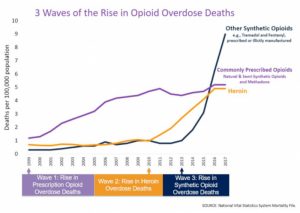
After being convicted at a jury trial on November 20, 2017 on two counts of negligent homicide, eleven counts of criminal distribution of dangerous drugs and nine counts of criminal endangerment, former Florence doctor Chris Christensen remains free on bail as he pursues an appeal of his conviction in the case. State prosecutors object to any continued delays.
On February 2, 2018, seventy-year-old Christensen was sentenced to serve 20 years in Montana State Prison with 10 years suspended for the crimes he committed, all related to overprescribing of opioids and involving at least two deaths. The imposition of sentence was stayed, however, and Christensen was released on bond, pending the outcome of an appeal to the Montana Supreme Court, which the defendant’s attorney, John Van de Wetering, indicated would be filed.
A notice of appeal was finally filed on May 29, 2018, but since then there have been several delays in the process as the defendant has yet to file the necessary transcripts of the District Court case at the Supreme Court. The responsibility and the cost for filing the transcripts rests with the appellant and his attorney.
Last August, Christensen was granted an extension on the deadline for filing the transcripts and given until September 25, 2018. In October, the deadline was extended again, this time to December 31, 2018. In January 2019, Christensen made another request for an extension and the state filed an objection to the motion.
In a lengthy affidavit, Ravalli County Attorney Bill Fulbright outlined in detail the delays in the process since charges were first filed back in August of 2015, that he claims were unnecessary. Now, he claims, the appeal is languishing because of Christensen’s failure to timely pay for the transcription costs for which he is personally liable.
“While the State in the vast majority of other appeals is usually more than willing to provide opposing counsel with a reasonable extension requested, and even commonly consent to the late filing of motions,” wrote the State in its objection to the recently requested delay, “the State here believes the additional 81 days, on top of the 147 days previously granted, is simply not necessary… At 70 years old, Christensen’s attempt to delay the appeal should be viewed with suspicion. This is reasonable considering Christensen’s many attempts in district court to delay the proceeding needlessly.”
On January 15, 2019, the Court ordered Christensen to submit the transcripts by February 19 or show up in court and explain why not. On the same day, the Court received a motion for leave to file a response to the state’s objections. That motion was denied the next day.
That denial was immediately followed by a motion to reconsider dated January 17.
On January 28, the Court issued an order permitting Christensen to file a response to the state’s objection to any further extension and then the Court will reconsider its order in the light of the new filing.
In the meantime, the February 19 deadline for submitting the transcripts remains in effect.
According to information from the Centers for Disease Control and Prevention, 70,237 drug overdose deaths occurred in the United States in 2017. The age-adjusted rate of overdose deaths increased significantly by 9.6% from 2016 (19.8 per 100,000) to 2017 (21.7 per 100,000). Opioids—mainly synthetic opioids (other than methadone)—are currently the main driver of drug overdose deaths. Opioids were involved in 47,600 overdose deaths in 2017 (67.8% of all drug overdose deaths).
Doctors from around the country are being taken to court as law enforcement moves to address the growing opioid crisis. According to an article in the Los Angeles Times, in February 2016, another doctor, Hsiu-Ying “Lisa” Tseng, was sentenced to 30 years to life in prison after three of her patients fatally overdosed. The Washington Post reported in June 2017 that an Oklahoma doctor was charged with second-degree murder in the death of five patients, some of whom died just days after receiving large prescriptions from the doctor.
According to the CDC, from 1999-2017, almost 400,000 people died from an overdose involving any opioid, including prescription and illicit opioids. This rise in opioid overdose deaths can be outlined in three distinct waves.
The first wave began with increased prescribing of opioids in the 1990s, with overdose deaths involving prescription opioids (natural and semi-synthetic opioids and methadone) increasing since at least 1999.
The second wave began in 2010, with rapid increases in overdose deaths involving heroin.
The third wave began in 2013, with significant increases in overdose deaths involving synthetic opioids – particularly those involving illicitly-manufactured fentanyl (IMF). The IMF market continues to change, and IMF can be found in combination with heroin, counterfeit pills, and cocaine.